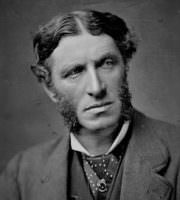About Matthew Arnold
Matthew Arnold (Laleham, 24 December 1822 - Liverpool, 15 April 1888) was a British poet, literary critic and educator. He is best known for his poem Dover Beach (written around 1849-51 and published in 1867), about the English town that was a port to France and Europe. In 1849 Matthew Arnold published his first volume of poetry, followed in 1852 by the second volume, Empedocles on Etna. In 1853, he began to publish poetry under his real name and practiced severe self-criticism of his earlier works, which in places lacked the classic-antique balance. There followed the academic classical tragedy Merope (1858) and the New Poems (1867) with elegies for the deceased father and a friend. Meanwhile, the author had turned more and more to cultural criticism. His poetic production, considered by some to be among the most important of the English Victorian period, was characterized by large-scale works, such as Tristram and Iseult (1852), the tragedies Empedocles on Etna (1852) and Merope (1858) and by short compositions such as the sonnet Shakespeare (1849), The Forsaken Merman (1849).His writings, mostly published in newspapers such as Cornhill and Fortnightly Review and only later collected in volumes, dealt with social and religious problems, as in the case of Culture and Anarchy (1869), in which the author assigned to culture the task of breaking the fences that separated the various social classes, with a background of optimism about the development of humanity as an organism. In later essays, such as Literature and Dogma (1873) and God and the Bible (1875), Arnold identified poetry as a possible substitute for both religion and metaphysics.
Browse all poems and texts published on Matthew Arnold









